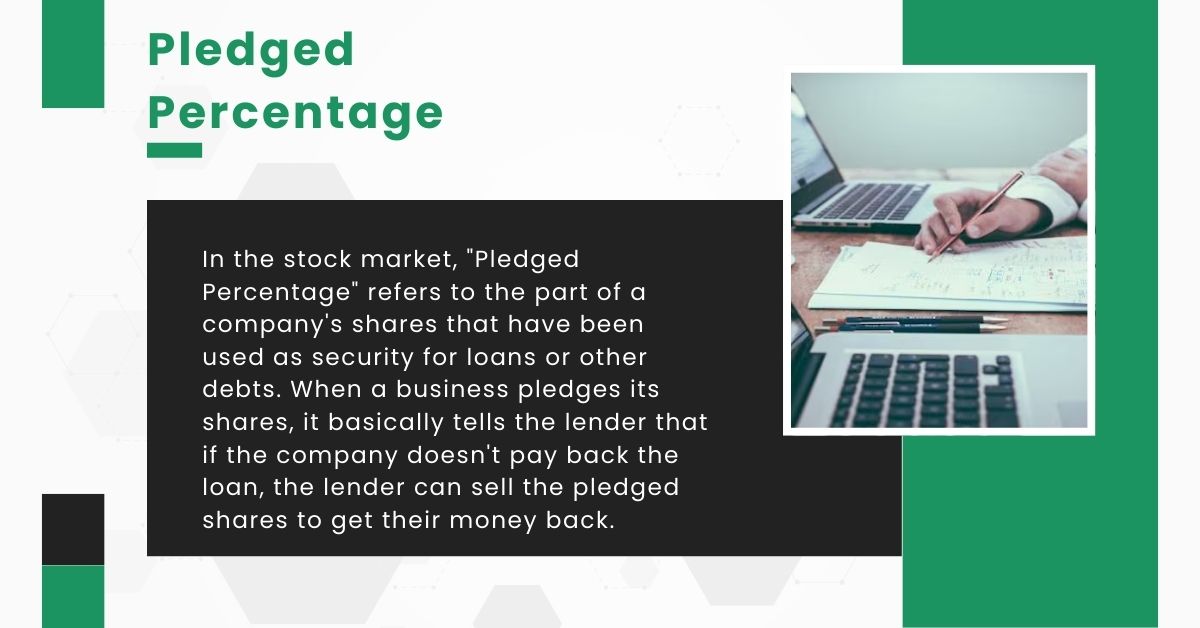For new investors, it’s important to understand a variety of financial ideas. The word “Pledge” is one of these ideas that stands out. Pledging is a one-of-a-kind deal that can have a big effect on buyers and the stock price as a whole. Investors and promoters use pledges to get money.
We will talk about the different kinds of pledges, how they work, and how they affect the stock market in this blog.
What is Pledged Percentage in Stock Market?

In the stock market, “pledged percentage” refers to the part of a company’s shares that have been used as security for loans or other debts. When a business pledges its shares, it basically tells the lender that if the company doesn’t pay back the loan, the lender can sell the pledged shares to get their money back.
When a business needs to quickly raise money or meet short-term financial responsibilities, they often do this. A high pledged percentage, on the other hand, can be a red flag for buyers because it means the company may be having money problems or may have made investments that are too risky.
How Does the Pledging of Shares Work?
When a company or person pledges their shares as collateral for a loan, this is called “pledging of shares.” The shares are basically held by a lender as collateral until the loan is paid back. In the event that the borrower doesn’t pay back the loan, the lender may sell the guaranteed shares to get their money back.
The borrower usually signs a pledge deal with the lender that spells out the loan terms, the shares that are being pledged, and what will happen if the loan isn’t paid back. The backer will keep the shares in a trust account until the loan is paid back. The renter gets their shares back if they pay back the loan in full. But if the user doesn’t pay back the loan, the lender can sell the shares on the open market to get their money back.
How Would the Shares Pledge Impact the Shareholders?
Pledged shares can affect owners in a number of ways, including:
- Dilution of Ownership: If the pledged shares are sold to pay off the loan, the number of outstanding shares goes up. This can make it harder for present shareholders to keep their ownership stake.
- Market Perception: A high promised percentage can make the market think that the company is in bad financial shape or is investing in risky things. The price of the stock may go down because of this.
- Governance Concerns: When shares are pledged, there are times when issues about corporate governance arise. If the lender has a lot of power over the guaranteed shares, they may be able to affect how the company is run.
- Confidence of Investors: A high committed percentage can make investors less confident because it could mean that the company is having money problems or is doing risky things. It might be hard for the business to get more money in the future because of this.
What is a Haircut?
In finance, a haircut is the loss a lender takes when an asset that was pledged is sold for less than its face value to pay off a loan. This usually happens when the asset’s value has gone down because of the market or something else.
The lender may have to sell the shares at a loss to get their money back if the company offers its shares as collateral for a loan and the price of the stock drops a lot. The loss is the difference between how much the shares were sold for and their face value.
Haircuts can be very risky for lenders because they can lower the amount they get back if the borrower doesn’t pay. In order to lower these risks, lenders usually ask borrowers to pledge assets that are worth more than the loan amount or to provide more collateral.
Why Do Promoters Pledge Shares?
There are several reasons why promoters promise shares:
- Promoters often promise shares as collateral for loans or other forms of financing in order to grow the business, do research and development, or meet short-term financial responsibilities.
- Promoters may sometimes promise shares to pay for personal expenses like buying a house or sending their kids to college.
- Using Existing Assets: Promoters can get more money for their business without selling all of their shares by pledging shares. This is called “leveraging existing assets.”
- Doubts About the Business: Promoters often show their doubts about the business’s future by promising shares. This can help investors and loans feel better.
- Meeting Regulatory Requirements: In some businesses or areas, promoters may have to give up some of their shares in order to get a license or regulatory approval.
Is Pledging of Shares Risky for Investors?
Yes, investors can take a risk when they pledge shares. Companies can use it to get money, but a high pledged portion can mean they are having money problems or are investing in risky things. If the business doesn’t pay back the loan, the lender might have to sell the promised shares, which could cause the stock price to drop.
A high pledged percentage can also make investors less confident, which can make it hard for the business to raise money in the future. Before investing in a company, investors should carefully look at the portion of the company that has been pledged.
Advantages and Disadvantages of Pledged Percentage
| Advantage | Disadvantage |
| Raises capital: Allows companies to secure loans without selling equity. | Financial risk: If the company defaults, the lender can sell the pledged shares, potentially leading to a decline in stock price. |
| Leverages assets: Enables companies to use existing assets to obtain additional funding. | Market perception: A high pledged percentage can negatively impact market perception, signaling financial distress. |
| Demonstrates confidence: Pledging shares can show confidence in the company’s future prospects. | Governance concerns: The lender may have influence over the company’s management decisions. |
| Flexibility: Provides companies with a flexible way to meet short-term financial needs. | Investor confidence: A high pledged percentage can erode investor confidence, making it difficult to raise capital in the future. |
Is Pledging of Shares Good or Bad?
It depends on the company and the owners whether pledging shares is a good or bad idea.
When companies pledge their shares, it can help them get money to pay their short-term debts and raise cash. Also, it can show that you believe in the company’s growth. But a high pledged percentage can be a red flag for buyers because it could mean that the company is having money problems or is investing in risky things. If the business doesn’t pay back the loan, the lender might have to sell the promised shares, which could cause the stock price to drop.
In the end, investing in a company with a high committed percentage is a personal choice that should be based on a careful examination of the business’s finances, its potential for growth, and the risks involved.

